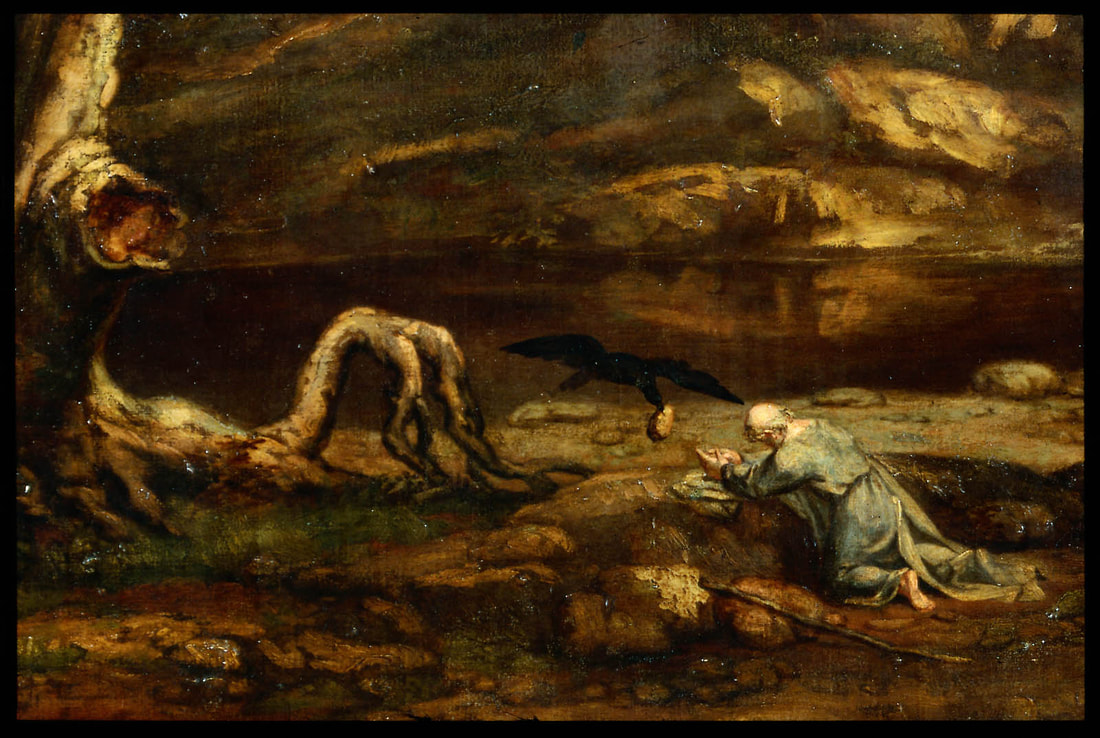 In the Bible, God communicates with his people in many different ways – most of them very loud! He speaks through a whirlwind in Job, an earthquake in Exodus and Hebrews, a voice like thunder in Samuel, Job, Psalm 104, and John. His address to Ezekiel is preceded by a storm and a “sound of tumult”; in Revelation, thunder and lightening rumble and flash around his throne. In only one place in the Bible does he speak in a “still, small voice”, and that is during his interchange with Elijah in the Judean Desert. When Abraham and Moses entered the desert, it was as part of a journey forward. Elijah, in contrast, was retreating - from the terrifying wrath of his arch enemy, Queen Jezebel. He fled first from the Northern Kingdom to Beersheba, a journey of about 260 miles, and then from Beersheba into the Judean desert. The desert was less a geographical location than a spiritual point in Elijah’s earthly pilgrimage, as it had been for the Israelites 600 years earlier. The true desert – where purification takes place - is not outside us, but within. Like a physical desert, our internal wilderness can be a place where we feel terrifyingly alone and in which we want to spend as little time as possible. Yet, it is only in this - at best inhospitable and at worst dangerous - place that we can encounter God. Even Jesus, the “new Elijah”, had to enter the desert – “driven” by the Spirit. This is a place in which we can be tempted by indifference, by lethargy, by fear, by despair, by self-doubt – “I can’t do this thing”. The Elijah of 1 Kings, Chapter 18 is a formidable man, standing alone on Mount Carmel against 450 prophets of Baal and a hostile king. He puts the prophets of Baal to the test, challenging them to bring fire to the earth through their prayers to Baal, and then himself successfully calling down fire and then water from heaven. He does not doubt for a moment that God will respond to his call. He triumphs over the false prophets and cows the sinister king, who goes back to his wife, Jezebel, and tells her all that Elijah had done. This rekindles her anger and she vows to have Elijah’s life. Having provided such spectacular proof that Yahweh is indeed God, Elijah confidently expected that the apostate Israelites would return to the true path. It didn’t happen. The only communication after the triumph on Mount Carmel was Jezebel’s death threat. It is astonishing to see how quickly terror takes over this towering Old Testament figure. Despite the many proofs he has had of God’s power and support, he runs for his life from an angry woman. By the time he enters the desert, he has given up all hope, and all faith in his mission. At the end of a day’s journey, he cries out in fear and exhaustion, “I have had enough, Lord. Take my life; I am no better than my ancestors.” Elijah is saying “I am not the person you think I am, Lord. I can’t do these things you ask of me. Don’t ask me to do any more.” Fear has given way to something more insidious, the state of acedia - described by Aquinas as “the sorrow of the world that wreaks spiritual death”, and by St John Cassian as the “noonday demon”. It is so easy to identify with Elijah here. Times of immense faith can evaporate in seconds, giving way to torpor and listlessness. Instead of living, we exist. And yet, there is much hope in this grim episode in the story of Elijah. In the loneliness of the desert, an angel comes to bring three nights of sound sleep and good sustenance. Then, refreshed, Elijah journeys 40 days and 40 nights to Mount Horeb, where in the silence of the desert, after the wind and the fire and the earthquake have passed, he is able to hear God’s “still, small voice” which gently asks him “Why are you here, Elijah?” Twice he asks, and twice Elijah is allowed to get all his grievances off his chest ““I have been very zealous for the Lord God Almighty. The Israelites have rejected your covenant, torn down your altars, and put your prophets to death with the sword. I am the only one left, and now they are trying to kill me too.” And then God sends him back the way he came, to achieve more and greater works than any he had done so far. I take comfort from this story of the weakness of the greatest of all the Old Testament prophets – the prophet who appeared along with Moses at the Transfiguration. Elijah, struck with paralysing discouragement, had to go into a lonely, silent desert and there unburden himself to the Lord of all his frustrations and fears. In that seemingly arid and unpromising place, he drew new strength and was able to answer the question, “Why are you here?” – not with words, but by embarking on a new journey over old terrain: “Go back the way you came”. I am reminded of TS Eliot’s lines from “Four Quartets”: “We shall not cease from exploration And the end of all our exploring Will be to arrive where we started And know the place for the first time.” Comments are closed.
|
AuthorHelen Gallivan is co-founder with John Dundon of New Pilgrim Path. This blog is adapted from ther book, Dawn without Darkness, published by Veritas. Archives
April 2022
Categories |
 RSS Feed
RSS Feed